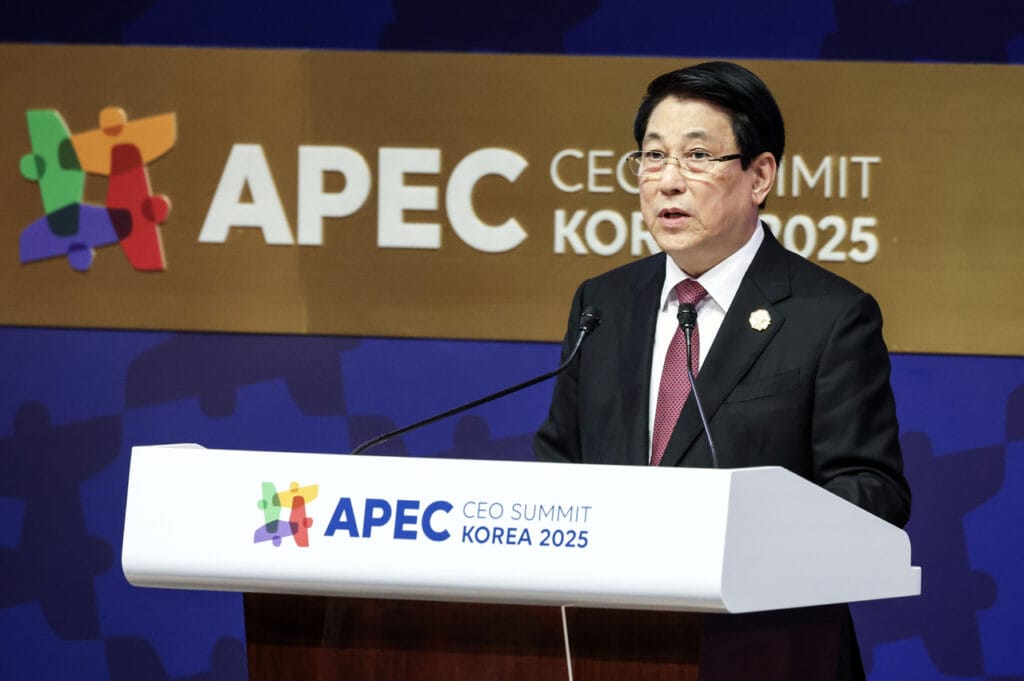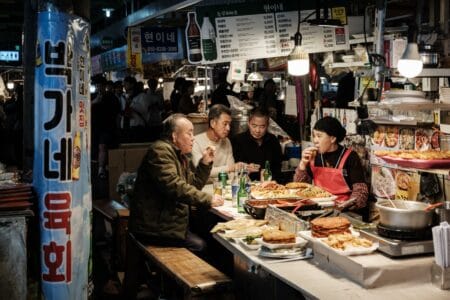October 31, 2025
GYEONGJU – Leaders from Thailand, Vietnam and the United Arab Emirates called for closer regional cooperation and open trade at the APEC CEO Summit on Thursday, warning that protectionism could undermine Asia’s growth momentum.
Vietnamese President Luong Cuong urged APEC business and policy leaders to embrace “an inclusive, cooperative and human-centered approach” to the Fourth Industrial Revolution.
He warned that artificial intelligence is already reshaping economies at “unprecedented speed,” and called on Asia-Pacific Economic Cooperation members to ensure that technology “serves humanity, not divides it.”
“AI must be rooted in cooperation and equality,” he said. “Only then can it sustain trust and prosperity.”
He pointed to Vietnam’s robust economic trajectory, pointing to the country’s 7.85 percent expansion in gross domestic product in the first nine months of 2025 and foreign direct investment disbursement of $18.8 billion in the same period.
“Vietnam’s door is always open,” Cuong said. “We welcome APEC partners to join us in building high-tech zones, smart cities and green industries. Together, we can write a new chapter of shared prosperity across the Asia-Pacific.”
Thai Prime Minister Anutin Charnvirakul pledged to make Thailand a “regional connector” in the global economy through inclusive growth, innovation and climate leadership.
Asia-Pacific partnership can “turn challenges into shared opportunities,” he said. “Cooperation in our region matters more now than ever.”
Anutin said Thailand is “moving from a middle-income to a high-income economy, from manufacturing to innovation, and from being a regional participant to becoming a regional connector.”
His administration’s “Quick Big Win” policy, he explained, aims to deliver short-term actions with long-term impact, bridging income gaps, expanding business opportunities and positioning Thailand at the forefront of next-generation industries.
Over 500,000 Thais have been reskilled in data analytics, AI and green technologies, while 200,000 small and midsized enterprises have joined digital programs to reach new customers. “Economic growth means little if it is not inclusive and innovation-driven,” he said.
Thailand’s transformation, he added, is being driven by partnerships with global conglomerates like Tesla, BYD, Foxconn, Google Cloud, AWS, Huawei and Microsoft investing in electric vehicles, AI and data centers.
With 5G coverage reaching 85 percent of the population, Thailand is also advancing toward membership in the Organization for Economic Cooperation and Development by 2030, aligning with international standards in governance and transparency.
Climate action is at the heart of Thailand’s growth model, he said. The nation aims for carbon neutrality by 2050 and net-zero emissions by 2065, backed by investments in green hydrogen, sustainable agriculture and low-carbon manufacturing.
“Prosperity that is shared is prosperity that lasts,” he said. “Thailand is fully open for business and partnership.”
Also emphasizing regional connectivity, UAE Minister of State for Foreign Trade Thani bin Ahmed Al Zeyoudi, speaking on behalf of Abu Dhabi Crown Prince Sheikh Khaled bin Mohamed bin Zayed Al Nahyan, urged nations to “build bridges, not barriers.”
Though not an APEC member, the UAE attended as a guest of honor at the invitation of President Lee Jae Myung.
“Our openness to the world is a source of strength,” Al Zeyoudi said, citing the UAE–Korea Comprehensive Economic Partnership Agreement, signed in 2024, which boosted bilateral non-oil trade by over 40 percent to around $23 billion.
He also noted the UAE’s expanding footprint in Asia’s green transition, including renewable-energy projects in Malaysia and Indonesia and industrial investments in India and Vietnam. “We have only begun to realize this region’s potential,” he said.
“The UAE will remain a willing partner in shaping a more connected, sustainable global economy.”







